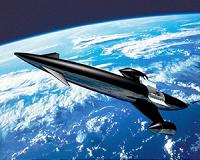 |
Bonn, Germany (SPX) Oct 08, 2010 On Tuesday, 5 October 2010, the German Aerospace Centre (Deutsche Zentrum fur Luft- und Raumfahrt; DLR) launched a support programme for students to develop, build and launch their own rockets. The programme goes by the acronym STERN from the German Studentische Experimental-Raketen, or Student Experimental Rockets. The programme is aimed at all universities that offer courses in aerospace technology. The rockets should have a small telemetry payload to transmit key trajectory data back to Earth during flight and provide information to the students including the rocket's altitude and speed. The rockets may be propelled by a solid-fuel, hybrid or steam motor. In order to teach the students engineering and science, and to put their technical knowledge to the test as early as possible in their studies, there are no height restrictions on the rocket. The programme will run for up to three years, depending on the university and the scope of the project. The students' work will be integrated into courses that already deal with various aspects of rocketry. In addition to the design of the engine, project activities will focus primarily on the rocket system as a whole, which demands interdisciplinary thinking and teamwork because of its complexity.
Experimenting under realistic conditions The students' tasks will include wind tunnel testing - recording the flow profile around the rocket and comparing it with models derived using computational fluid dynamics. Other fields of activity focus on the design of pressure vessels such as tanks and motor casings, the nozzle geometry and strength calculations (finite element analysis) for the rocket components.
Breaking the European altitude record with a student-developed propulsion system There, the European altitude record of 12.55 kilometres for an amateur rocket was set. To break this record and fly even higher could be a long-term objective of the DLR programme during its planned three-year duration - offering universities a long-term prospect for training a new generation of researchers, particularly in the area of astronautics. Leading the programme is the DLR Space Agency in Bonn, supported by DLR's Mobile Rocket Base (Mobilen Raketen Basis; MORABA). Eurolaunch - a cooperative venture between MORABA and the Swedish Space Corporation's Esrange Space Center - will run the flight campaigns. Eligible universities are invited to submit their application now; the project starts in January 2011.
Share This Article With Planet Earth
Related Links German Aerospace Center (DLR) Rocket Science News at Space-Travel.Com
 U.K. predicts 'spaceplane' in 10 years
U.K. predicts 'spaceplane' in 10 yearsLondon (UPI) Sep 17, 2010 British engineers say they believe spacecraft taking off from an ordinary airport runway and carrying tourists into space might be a reality in 10 years. A British company, Reaction Engines Ltd., is developing a spaceplane it says will travel five times the speed of sound and carry up to 24 passengers and up to 12 tons of cargo into space, The Daily Telegraph reported Friday. The ... read more |
|
| The content herein, unless otherwise known to be public domain, are Copyright 1995-2010 - SpaceDaily. AFP and UPI Wire Stories are copyright Agence France-Presse and United Press International. ESA Portal Reports are copyright European Space Agency. All NASA sourced material is public domain. Additional copyrights may apply in whole or part to other bona fide parties. Advertising does not imply endorsement,agreement or approval of any opinions, statements or information provided by SpaceDaily on any Web page published or hosted by SpaceDaily. Privacy Statement |